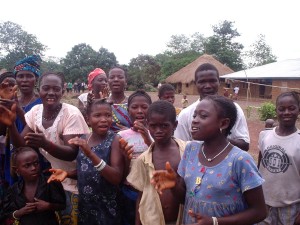Communication Plays a Critical Role in Ebola Crisis
During a capacity building workshop in Freetown, Sierra Leone this past June, the mood was understandably tense as Ebola continued to spread from the East. Tea-break conversations became heated about regional responses to it. While no one agreed on how long it would last or the toll it would ultimately take, one thing was universally accepted: there was a strong need for social and behavior change communication (SBCC) in communities.
One of the workshop participants, Reverend Alimamy Kargbo of the Inter-religious Council of Sierra Leone and Chair of the Global Fund Country Coordinating Mechanism in Sierra Leone, put it this way, “We are troubled and confused about the rate of the spread and the major reason for the spread has been denial [of Ebola] and not taking heed of instructions issued by the Government and other health workers,” he said. “Now that many people have accepted the reality of its existence and its deadliness, it is as they say ‘out of control’ and still beyond the scope of government to contain it.”
The SBCC challenges related to Ebola are many: the virus can be transferred through local customs and practices such as funerary preparations, including washing the dead, and by eating bush meat that carry the virus. Improper handling of Ebola victims by family members and health workers and avoidance of hospitals and health centers are also major causes of the spread.
“People are too afraid to go to the hospital or health facilities for fear that they will be diagnosed with Ebola,” Kargbo continued, and since there is no known cure, going to a health facility is not an attractive option for many. “Besides, some nurses and health workers are running away for fear of contracting the disease as little or no protective gear are available in some health facilities.”
The Harvard Business Review (HBR) and the World Bank blog both ran articles this week on the critical need for SBCC in Guinea, Liberia, Sierra Leone and other countries in the region where Ebola may be spreading, highlighting entertainment-education (EE) as one approach that helps people consider changing current behaviors and attitudes. As the articles point out, EE has been used with good results for other health issues such as HIV/AIDS, malaria, and nutrition.
The HBR cited drama theory research from Lawrence Kincaid, a health communication expert with Johns Hopkins Bloomberg School of Public Health Center for communication Programs (JHU.CCP), which is a leader in the field of SBCC and entertainment-education. Kincaid has found that “audiences empathize with characters and vicariously live their conflicts through them, even riding with them through their change of mind.” Like many communication strategies, the ones for Ebola, according to the World Bank article, include a variety of communication vehicles such as text messaging via mobile phones, community mobilization and door-to-door outreach.It also reported that UNICEF and partners are engaging in participatory theater to spread messages, giving message-driven theater performances in communities and bus terminals.
“The more that people are transported into the world of the narrative, the more they feel immersed in the story, the more likely they are to change their beliefs to be more consistent with those expressed in the world of the narrative,” said researcher Melanie Green, in a quote from the HBR.
As of August 4, there have been 1,711 infections and 932 deaths from Ebola in these countries, and even more have been affected by the toll the virus is taking on people’s everyday lives. Last week, the World Health Organization declared the outbreak a global health emergency. SBCC must be a critical component of any global public health strategy to stop Ebola from spreading further in the region – or the world.
“I hope that we start our communication programs sooner rather than later in countries that may be affected in the coming days such as Nigeria, before people are too fearful or panicked,” said Caroline Jacoby, Senior Program Officer with JHU.CCP who teaches a course called Entertainment Education for Behavior Change and Development in Johns Hopkins Bloomberg School of Public Health. “Shifting long-held practices and behaviors is difficult, but once people start taking the appropriate actions to keep themselves, their families and their communities safe, these actions can start becoming the ‘norm,’ and have an impact on lives.”









Leave a Reply
Want to join the discussion?Feel free to contribute!